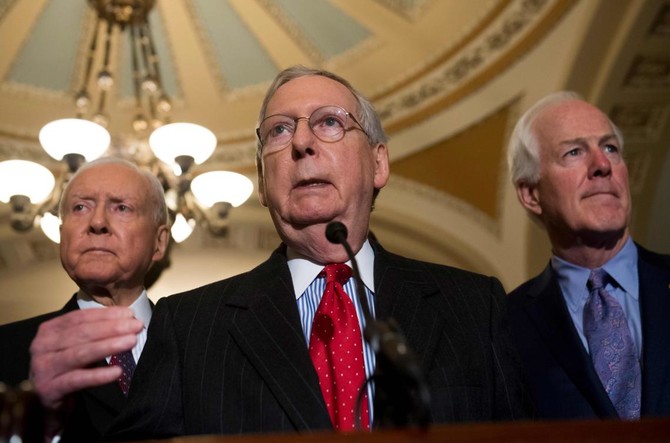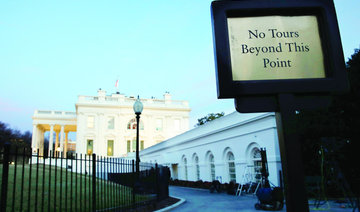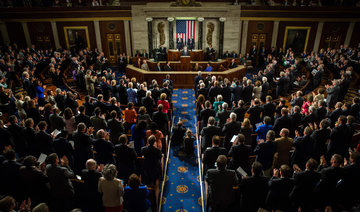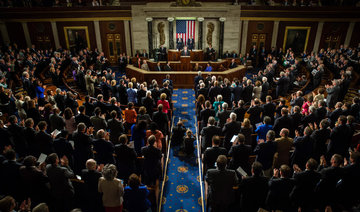WASHINGTON: The top senator from US President Donald Trump’s party urged lawmakers to “step back from the brink” as they gathered Sunday for a crunch vote to keep the government shutdown from stretching into the coming work week.
Hundreds of thousands of federal employees are set to stay home without pay as of Monday morning following the dramatic collapse Friday night of talks to agree on an urgent funding measure.
The shutdown cast a huge shadow over the first anniversary of Trump’s inauguration as president and highlighted the deep divisions between Republicans and Democrats.
Senate Majority Leader Mitch McConnell warned that the shutdown would “get a lot worse” if federal workers have to stay home without pay.
“Today would be a good day to end it,” McConnell said from the Senate floor during a rare Sunday session aimed at hashing out a deal ahead of a vote he said would take place at 1:00 am (0600 GMT) Monday, unless progress is made sooner.
Lawmakers have traded bitter recriminations for the failure to pass a stop-gap funding measure, and McConnell once again sought to pin the blame on Senate Minority Leader Chuck Schumer.
Trump early Sunday encouraged the Senate’s Republican leaders to invoke the “nuclear option” — a procedural maneuver to change the chamber’s rules to allow passage of a budget by a simple majority of 51 votes to end the shutdown.
“If stalemate continues, Republicans should go to 51% (Nuclear Option) and vote on real, long term budget, no C.R.’s!” he tweeted, referring to the stop-gap funding measure.
But Senate leaders have been wary of such a move in the past, as it could come back to haunt them the next time the other party holds a majority.
White House budget director Mick Mulvaney on Sunday accused some Democrats of wanting to “deny the president sort of the victory lap of the anniversary of his inauguration” — echoing a complaint Trump made on Twitter the day before.
“There’s other Democrats who want to see the president give the State of the Union during a shutdown,” Mulvaney said on Fox, referring to the nationally televised address Trump is to deliver on January 30.
At the heart of the dispute is the thorny issue of undocumented immigration.
Democrats have accused Republicans of poisoning chances of a deal and pandering to Trump’s populist base by refusing to back a program that protects an estimated 700,000 “Dreamers” — undocumented immigrants who arrived as children — from deportation.
Schumer said he and Democrats were willing to compromise, but Trump “can’t take yes for an answer — that’s why we’re here.”
“I’m willing to seal the deal, to sit and work right now with the president or anyone he designates — let’s get it done,” Schumer said.
Trump has said Democrats are “far more concerned with Illegal Immigrants than they are with our great Military or Safety at our dangerous Southern Border.”
Essential federal services and military activity are continuing, but even active-duty troops will not be paid until a deal is reached to reopen the US government.
There have been four government shutdowns since 1990. In the last one, in 2013, more than 800,000 government workers were put on temporary leave.
“We’re just in a holding pattern. We just have to wait and see. It’s scary,” Noelle Joll, a 50-year-old furloughed US government employee, told AFP in Washington.
A deal had appeared likely on Friday afternoon, when Trump — who has touted himself as a master negotiator — seemed to be close to an agreement with Schumer on protecting Dreamers.
But no such compromise was in the language that reached Congress for a stop-gap motion to keep the government open for four more weeks while a final arrangement is discussed. And Republicans failed to win enough Democratic support in the Senate to bring it to a vote.
Republicans have a tenuous one-seat majority in the Senate, and on Friday needed to lure some Democrats to their side to get a 60-vote supermajority to bring the motion forward. They fell 10 votes short.
The measure brought to Congress would have extended federal funding until February 16 and reauthorized for six years a health insurance program for poor children — a long-time Democratic objective.
But it left out any action on the Deferred Action on Childhood Arrivals program, known as DACA, that affects Dreamers.
White House officials insisted there was no urgency to fix DACA, which expires March 5.
Highlighting the deep political polarization, crowds estimated to number in the hundreds of thousands took to the streets of major US cities including Los Angeles, New York and Washington over the weekend to march against the president and his policies and express support for women’s rights.
Protesters hoisted placards with messages including “Fight like a girl,” “A woman’s place is in the White House” and “Elect a clown, expect a circus.”
Lawmakers to vote on pulling US ‘back from brink’ on shutdown
Lawmakers to vote on pulling US ‘back from brink’ on shutdown

Watchdog refers 40 UK charities to police over Israel-Hamas war

- Charity Commission opens further 200 regulatory cases related to the conflict in Gaza
- Head of the organization says it is cracking down on antisemitism and hate speech
LONDON: Regulators in the UK investigating breaches of rules by charitable organizations during their activities linked to the war between Hamas and Israel in Gaza have referred 40 cases to the police since the Oct. 7 attacks last year.
The Charity Commission also opened 200 regulatory cases related to the conflict during the same period, the watchdog’s chairperson, Orlando Fraser, said.
The figures offer further evidence of the extent to which the fighting in the Middle East has led to polarization and hateful rhetoric in Europe and the US. In the UK’s charity sector, where many of the organizations have religious affiliations, the conflict has resulted in hundreds of cases the Charity Commission has felt the need to investigate.
The watchdog has moved robustly to take action against “perpetrators of concerning activities linked to the ongoing conflict in Israel and Gaza, including antisemitic and hate speech,” Fraser said during a speech at the commission’s annual general meeting on Tuesday.
The 200 regulatory cases related to the war it has looked into involved charities “with different views on the conflict,” he added. The 40 referrals to the police were made in cases where the commission considered criminal offenses might have been committed.
“We are clear that charities must never become vehicles for hate and we have robustly enforced that position,” Fraser said.
UK counter terrorism police arrest seven over ‘PKK activity’

- British police said they were carrying out searches at eight premises across London, including the Kurdish Community Center in the north of the capital
LONDON: British police said they had arrested seven people and were searching a Kurdish community center in London as part of a counter terrorism investigation into suspected activity linked to the banned Kurdistan Workers Party, known as the PKK.
Those arrested were five men and two women, aged between 23 and 62, police said, adding there was no imminent threat to the public.
“This activity has come about following a significant investigation and operation into activity we believe is linked to the terrorist group PKK,” said Acting Commander Helen Flanagan.
“These are targeted arrests of those we suspect of being involved in terrorist activity linked to the group.”
The PKK, a militant group founded in southeast Turkiye in 1978 with the aim of creating an independent Kurdish state, was banned in Britain in 2001. The group has been involved in a 40-year conflict, leading to more than 40,000 deaths.
British police said they were carrying out searches at eight premises across London, including the Kurdish Community Center in the north of the capital, which is likely to be closed to the public for up to two weeks.
Flanagan said later on Wednesday that the police understood the arrests had caused concern among some local communities, especially those in the Kurdish community.
“I want to reassure the community that our activity is being carried out to keep everyone safe from potential harm, including those within the Kurdish community itself,” Flanagan said.
Trump selects longtime adviser Keith Kellogg as special envoy for Ukraine and Russia

- As special envoy for Ukraine and Russia, Kellogg will have to navigate an increasingly untenable war between the two nations
- Trump has criticized the billions that the Biden administration has poured into Ukraine
WEST PALM BEACH, Florida: President-elect Donald Trump said Wednesday that he has chosen Keith Kellogg, a highly decorated retired three-star general, to serve as his special envoy for Ukraine and Russia.
Kellogg, who is one of the architects of a staunchly conservative policy book that lays out an “America First” national security agenda for the incoming administration, will come into the role as Russia’s invasion of Ukraine enters its third year in February.
Trump made the announcement on his Truth Social account, and said “He was with me right from the beginning! Together, we will secure PEACE THROUGH STRENGTH, and Make America, and the World, SAFE AGAIN!”
Kellogg, a retired Army lieutenant general who has long been Trump’s top adviser on defense issues, served as national security adviser to Vice President Mike Pence, was chief of staff of the National Security Council and then stepped in as an acting security adviser for Trump after Michael Flynn resigned.
As special envoy for Ukraine and Russia, Kellogg will have to navigate an increasingly untenable war between the two nations.
The Biden administration has begun urging Ukraine to quickly increase the size of its military by drafting more troops and revamping its mobilization laws to allow for the conscription of troops as young as 18.
The White House has pushed more than $56 billion in security assistance to Ukraine since the start of Russia’s February 2022 invasion and expects to send billions more to Kyiv before Biden leaves office in less than months.
Trump has criticized the billions that the Biden administration has poured into Ukraine. Washington has recently stepped up weapons shipments and has forgiven billions in loans provided to Kyiv. The incoming Republican president has said he could end the war in 24 hours, comments that appear to suggest he would press Ukraine to surrender territory that Russia now occupies.
As a co-chairman of the American First Policy Institute’s Center for American Security, Kellogg wrote several of the chapters in the group’s policy book. The book, like the Heritage Foundation’s “Project 2025,” is a move to lay out a Trump national security agenda and avoid the mistakes of 2016 when he entered the White House largely unprepared.
Kellogg in April wrote that “bringing the Russia-Ukraine war to a close will require strong, America First leadership to deliver a peace deal and immediately end the hostilities between the two warring parties.”
Kellogg was a character in multiple Trump investigations dating to his first term. He was among the administration officials who listened in on the July 2019 call between Trump and Volodymyr Zelensky in which Trump prodded his Ukrainian counterpart to pursue investigations into the Bidens.
The call, which Kellogg would later say did not raise any concerns on his end, was at the center of the first of two House impeachment cases against Trump, who was acquitted by the Senate both times.
On Jan. 6, 2021, hours before pro-Trump rioters stormed the US Capitol, Kellogg, who was then Pence’s national security adviser, listened in on a heated call in which Trump told his vice president to object or delay the certification in Congress of President Joe Biden ‘s victory.
He later told House investigators that he recalled Trump saying to Pence words to the effect of: “You’re not tough enough to make the call.”
FBI says bomb threats made against Trump nominees

- “The FBI is aware of numerous bomb threats and swatting incidents targeting incoming administration nominees and appointees,” the agency said
- Elize Stefanik, a Trump loyalist congresswoman tapped to be UN ambassador, said her residence in New York was targeted in a bomb threat
WASHINGTON: Several members of Donald Trump’s incoming administration have received threats including bomb alerts, the FBI said Wednesday, with one nominee reporting a pipe-bomb scare sent with a pro-Palestinian message.
“The FBI is aware of numerous bomb threats and swatting incidents targeting incoming administration nominees and appointees, and we are working with our law enforcement partners,” the agency said in a statement.
Swatting refers to the practice in which police are summoned urgently to someone’s house under false pretenses. Such hoax calls are common in the United States and have seen numerous senior political figures targeted in recent years.
Karoline Leavitt, a spokeswoman for Trump’s transition team, earlier said that several appointees and nominees “were targeted in violent, unAmerican threats to their lives and those who live with them.”
Elize Stefanik, a Trump loyalist congresswoman tapped to be UN ambassador, said her residence in New York was targeted in a bomb threat.
She said in a statement that she, her husband, and small son were driving home from Washington for the Thanksgiving holiday when they learned of the threat.
Lee Zeldin, Trump’s pick to lead the Environmental Protection Agency, said his home was targeted with a pipe bomb threat sent with a “pro-Palestinian themed message.”
The former congressman from New York said he and his family were not home at the time.
Fox News Digital quoted unidentified sources saying that John Ratcliffe, Trump’s nominee to head the CIA, and Pete Hegseth, the defense secretary pick, were also targeted.
Ahead of his return to the House in January, Trump has already swiftly assembled a cabinet of loyalists, including several criticized for a severe lack of experience.
The Republican, who appears set to avoid trial on criminal prosecutions related to attempts to overturn his 2020 election loss, was wounded in the ear in July in an assassination attempt during a campaign rally. The shooter was killed in counter-fire.
In September, authorities arrested another man accused of planning to shoot at Trump while he played golf at his course in West Palm Beach, Florida.
Biggest snowstorm in half century hits Seoul

- Around 300 flights were grounded, massive crowd at subways caused delays
SEOUL: The biggest November snowstorm to hit South Korea’s capital in more than a half century blanketed the capital on Wednesday, grounding hundreds of flights, disrupting commuter traffic and leaving at least two dead.
South Korea’s weather agency said 20 to 26 centimeters of snow fell in northern areas of Seoul and nearby areas. The agency said it was the heaviest snowstorm Seoul has experienced in November in 52 years. A storm on Nov. 28, 1972, dumped 12 centimeters.
South Korea’s Yonhap news agency said one person died and four others were injured in a five-vehicle accident in the eastern town of Hongcheon. The storm blanketed much of the country, with the central, eastern and southwestern regions recording about 10 to 28 centimeters of cover.
At least 317 flights were canceled or delayed at airports nationwide, while authorities ordered around 90 ferries to remain at port. They also shut down hundreds of hiking trails.
Icy road conditions slowed down the morning commute in Seoul and led to massive crowds at subways, causing delays. Emergency workers across the country responded to fallen trees, road signs and other safety risks.
Officials at the Safety Ministry said they couldn’t confirm any school closures as of Wednesday afternoon. Visitors dressed in traditional hanbok garb were busy taking photographs at Seoul’s snow-covered medieval palaces while snowmen popped up in playgrounds and schoolyards across the country.
The weather agency said snow will continue in most parts of the country until noon Thursday.
President Yoon Suk Yeol instructed the safety and transport ministries to mobilize all available relevant personnel and equipment to prevent traffic and other accidents.





















